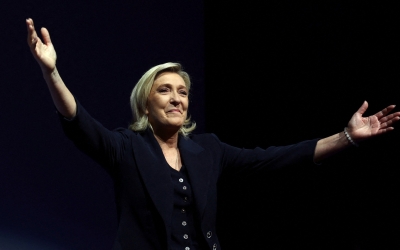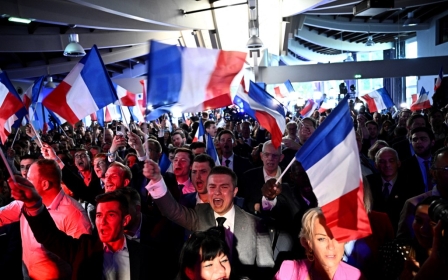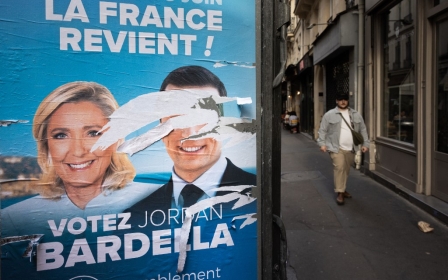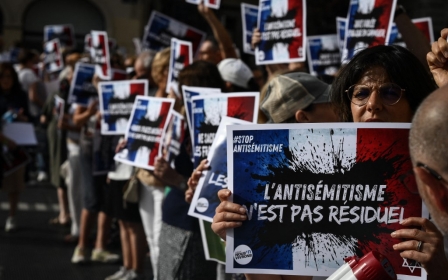French elections: Descendants of North African immigrants unite against far right
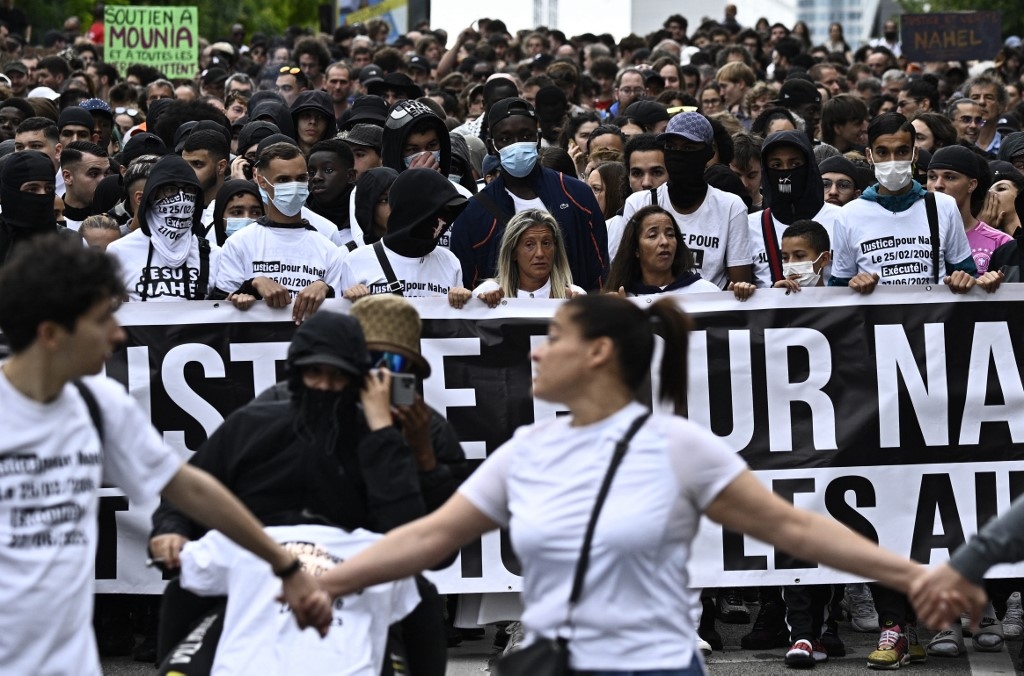
On Monday afternoon, in front of the Pablo Picasso primary school in Nanterre, in the western suburbs of Paris, the state of the electoral billboards revealed the voting trend for the first round of the legislative elections which took place the day before.
In this social housing estate of 14,000 inhabitants, mainly of foreign origins, the poster of Sabrina Sebaihi, former deputy and candidate for the green movement within the New Popular Front (NFP), a coalition of left-wing parties created after the victory of the far-right National Rally (RN) in the June European elections, was intact.
The bills of her main rivals, Isabelle de Crecy and Melina Bravo, respectively candidates for Together, the centrist presidential alliance, and the RN, were half torn off.
“Here, undoubtedly, almost everyone voted for the NFP,” Djamel Saifi, a 42-year-old French-Algerian bus driver, told Middle East Eye.
While waiting for his children in front of the school, he commented extensively on the results of the first round in Nanterre.
New MEE newsletter: Jerusalem Dispatch
Sign up to get the latest insights and analysis on Israel-Palestine, alongside Turkey Unpacked and other MEE newsletters
In this working-class city, which until the 1960s was home to one of the largest slums in France, populated by thousands of Algerian immigrant workers, Sebaihi, herself the daughter of an Algerian worker, won the first round of the election with 49.13 percent of the votes.
De Crecy came second with 29.62 percent. Both candidates will contest the second round set for this Sunday to settle seats where there has been no outright winner.
“Sabrina Sebaihi is on her way to win the second round. But let’s be careful, we never know. Indeed, a few years ago, no one imagined that the far right would arrive at the gates of power, but now it is on the verge of obtaining an absolute majority in the National Assembly,” Saifi said.
He was disconcerted by the nation-wide victory of the RN in the first round of the elections: the party obtained 9 million votes against 4 million at the same stage of the previous legislative elections in 2022.
‘We must protect our children’
Still affected by the history of the Algerian war of independence during which two of his great-uncles died as fighters, Saifi regrets that a party founded by a former army officer accused of torturing Algerians, Jean-Marie Le Pen, and former members of the OAS (Secret Army Organisation) - a French far-right paramilitary group which opposed the independence of Algeria with violent means - became so popular, while also entertaining hatred of immigrants and Muslims.
“A French colleague at work admitted to me a few days ago that he would vote RN because [the party’s president] Jordan Bardella was going to restore order in the banlieues once he becomes prime minister,” Saifi added.
‘If we do not manage to swing into action to reverse the trend and offer a victory to the New Popular Front, France will be lost and us with it’
- Nadia Sebaoui, left-wing activist
The bus driver fears an increase in police violence if the far right takes power.
A year ago, the death of Nahel Merzouk, a 17-year-old French-Algerian killed by a police officer for refusing to comply during a roadside check, plunged Nanterre and several cities across the country into chaos after a series of riots.
The killing took place on Nelson Mandela Square, a few hundred meters from the Pablo Picasso school, next to where Merzouk lived.
Last Saturday, for the first anniversary of his death, Mounia Merzouk, his mother, organised a white march attended by hundreds of people.
Addressing the crowd, she reminded people of the importance of casting their ballot.
“You know what’s happening tomorrow, wake up, we have to avoid deaths. We must protect our children,” she told demonstrators while demanding justice for Nahel.
Nadia Sebaoui, a 26-year-old activist for the left-wing France Unbowed party who participated in the gathering, thinks that an RN victory in the current climate, marked by the rise of racist hatred, would make the police even more repressive.
“This is why we absolutely must go to the polls in great numbers in the second round to block the RN where it is still possible,” she told MEE on the outskirts of the Pablo Picasso estate.
In 315 electoral districts across France (out of 577), no candidate has secured a majority.
In Mantes-la-Ville, a town close to Nanterre where Sebaoui handed out leaflets ahead of the first round, a showdown will take place between the NFP contender, who came first with 44.92 percent of the votes, and the RN candidate (30.97 percent).
“If we do not manage to swing into action to reverse the trend and offer a victory to the New Popular Front, France will be lost and us with it,” the activist warned.
A reminder of ‘the darkest moments in French history’
Sebaoui was still shocked by Bardella’s latest campaign promise to bar dual nationals from certain state jobs.
“This policy reminds me of the darkest moments in French history when the Vichy government [collaborating with the Nazi occupiers] published a decree in 1940 on the status of Jews which specified the professions which were prohibited to them,” she said.
Mhamed Kaki, president of Les Oranges, a local organisation that aims to raise awareness about the history of the Algerian immigration in France, shared these concerns and recalled another dark page of France’s history.
‘We must rally so that young people in our neighbourhoods are not considered second-class citizens and also to honour the memory of our elders who sacrificed themselves to build France’
- Mhamed Kaki, president of Les Oranges
“During the colonisation of Algeria, the French state also established a Code de l’indigénat [‘code of indigenous people’] which did not allow Algerians to enjoy all the citizenship rights,” he told MEE.
For Kaki, a possible RN victory in the legislative elections is “a situation of very serious endangerment” for people from immigrant backgrounds.
He fears a large transfer of votes from the right and the presidential alliance towards the RN in the second round.
“It’s because of [president Emmanuel] Macron anyway that the far right is on the rise. He laid the groundwork with policies of rejection of foreigners and French Muslims,” Kaki said.
In 2021, the parliament passed the “law consolidating the principles of the republic”, pushed forward by Macron to fight “Islamist separatism”, and accused by its detractors of being discriminatory against Muslims.
And earlier this year, his government adopted a controversial bill aimed at toughening immigration measures, with the jubilant endorsement of the National Rally.
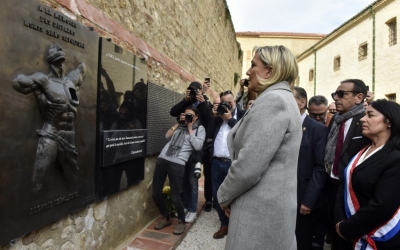
“Macron also worked to demonise the left because of its support for Palestine. It is shameful,” he added. France Unbowed’s pro-Palestinian positions, particularly since Israel's war on Gaza began in October, have attracted accusations that the party is antisemitic, which it forcefully denies.
At 64, Kaki, who spent part of his childhood in the shantytown of Nanterre, does not admit defeat. With activists from his association, he is visiting several working-class neighbourhoods in the Paris region this week to ask residents to vote on Sunday.
“We must rally so that young people in our neighbourhoods are not considered second-class citizens and also to honour the memory of our elders who sacrificed themselves to build France,” he said, recalling that in the 1970s, dozens of North African workers were killed in racist attacks.
Middle East Eye delivers independent and unrivalled coverage and analysis of the Middle East, North Africa and beyond. To learn more about republishing this content and the associated fees, please fill out this form. More about MEE can be found here.


